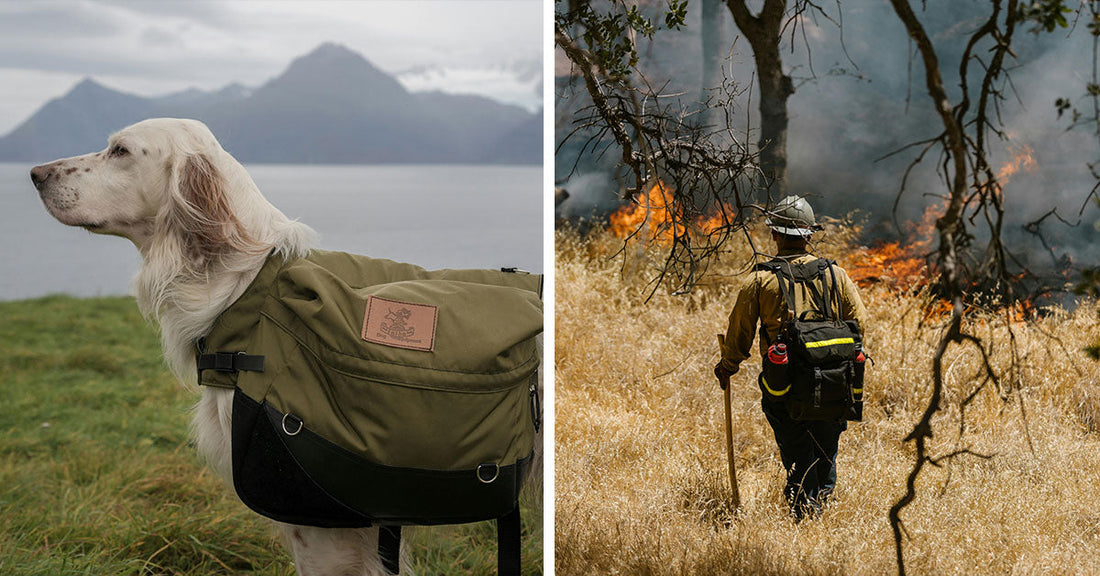Seed-Carrying Dogs Bring Life Back to Forests After Wildfires
Matthew Russell
A new breed of conservationist is racing through forests and woodlands—on four legs. In Chile and England, dogs equipped with seed-dispersing backpacks are helping revive ecosystems damaged by wildfires and heavy human traffic. These canine helpers are proving to be an unexpected but powerful force in environmental recovery.

Dogs are being trained to reforest areas destroyed by wildfires.
From Fire to Forest: Chile’s Seed-Carrying Heroes
In Chile’s Maule region, two sisters have turned a personal tragedy into a movement. Constanza and Fernanda Torres watched helplessly as wildfires swept through their beloved hills in 2017, wiping out 14% of the surrounding land and leaving behind a scorched, lifeless expanse. Amid the devastation, they saw opportunity—and enlisted their dogs to help bring life back to the land.
The sisters began training their border collies to carry seed-filled backpacks across fire-ravaged hills. “When we brought the dogs out, they loved running with the backpacks,” Fernanda told Orato World. “They covered much more ground than we could on our own.”
With careful planning, the women gathered native seeds from unburned areas, created drought-tolerant mixes, and launched their grassroots reforestation campaign—literally one pawstep at a time.
Each dog took on a specific zone, and returned for a refill before heading back out. The dogs, like Das and her daughters Summer and Olivia, worked in pairs or trios, guided by commands and rewards.

The dogs wear special backpacks filled with native seeds.
Grassroots Rewilding in England
More than 7,000 miles away, a similar project bloomed in the town of Lewes in East Sussex, England. The Railway Land urban nature reserve had been loved nearly to death by decades of foot traffic. Native plants were vanishing, and no natural regeneration seemed to follow.
“We weren’t seeing any plants coming up,” said Dylan Walker of the Railway Land Wildlife Trust told The Washington Post. “People were loving our urban nature reserve to death.”
Walker’s team was inspired by the Torres sisters in Chile. They launched a pilot project in 2024, recruiting local dogs to wear backpacks loaded with seeds of native wildflowers like foxgloves and bluebells. The packs, equipped with small holes, released seeds as the dogs explored areas off the beaten path.
Some owners noticed trails of seed and sand where their dogs had gone.
“You could follow the trail where they went,” dog owner Steve Lewis told BBC Sussex.
The initiative sought to mimic the ecosystem role once filled by wolves, who were hunted to extinction in the U.K. centuries ago.

The initiative began after devastating wildfires in the Maule region in 2017.
Why Dogs Are Perfect For This Job
Dogs are naturally curious, energetic, and often go where humans don’t.
“They tend to get into nooks and crannies,” Helen Meade of the Railway Land Wildlife Trust told the Times. And they don’t mind carrying gear. In fact, many seem to enjoy the added purpose.
In Chile, the Torres sisters took it further—training their dogs to avoid hazards, ignore birds, and follow verbal cues. Their program expanded to include seed delivery to schools and tree donations during dry years when field planting wasn’t viable, Orato World reports.
Long-Term Impact and a Shift in Perspective
It will take years to measure the full environmental impact. But early signs are promising. Some plants have already begun sprouting at the Lewes reserve. Because many are perennials, more growth is expected next spring, Smithsonian Magazine reports.
Walker also sees another benefit: public education.
“We want to engage and teach people about the ecological impacts of wildlife,” he told The Guardian. He believes dogs can be reimagined as allies in conservation rather than nuisances. “What if we viewed dogs differently? What if we reimagined dogs as our semi-wild partners?”
A Growing Movement With Deep Roots
Whether bounding through the hills of Chile or trotting across English meadows, these four-legged rewilders are reshaping our understanding of what dogs can do. The Torres sisters remain committed, collecting seeds, planting trees, and bringing back birds, insects, and reptiles that once vanished from their hills.
“We never see it as a commercial venture,” Constanza told Orato World. “We view it as something we can and want to do.”
In the right paws, a simple backpack can become a tool for hope, healing, and the return of wild beauty.

